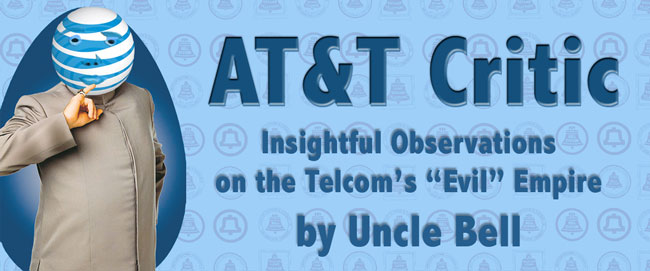So AT&T got smacked hard on the ass this week. The Department of Justice filed a suit to stop its merger with T-Mobile. It's almost enough to make one believe in America again. Of course, we can't completely assume AT&T won't eventually get away with this obviously anti-competitive absorption of one of its few true competitors. I'm sure AT&T has lobbyists rushing into smoke filled rooms with suitcases full of cash to try to buy off politicians and regulators. Heck, it's worked for them well in the past.
Or has it? Let's enjoy the moment and assume that the lawsuit prevails, as it should under any logical reading of the law. That means the merger doesn't go through, and the first problem for AT&T's greedy overreach is a huge 6 billion dollar penalty.
This is almost twice what it would have cost AT&T to simply build out its regional service, one of the supposed reasons for the ridiculous $39 billion dollar merger. For some reason, AT&T decided that it was a great strategy to provide poor national service, with the assumption that politicians and regulators would cave in on anything they asked for in "hopes" that service would improve in the heartland.
The problem is, years of crappy AT&T service, despite tons of approved mergers, extra spectrum and even out and out payments by the US government has put to lie that idea. No one believes AT&T anymore when it says it will improve service.
And that's why it's so dangerous that AT&T doesn't have a backup plan. Their plan, since changing their name to AT&T, was to use cash generated by local monopolies to buy national monopolies. To do this, they ripped off grandma's in local markets that were afraid to turn off their land lines, provided them with outrageously expensive, but crappy service, and then used the cash to, first: enrich their executives, two: buy up politicians, and three: buy up competitors. Then repeat.
Never, during the entire process, did service improve. And in fact, the entire shell game probably would have failed if it wasn't for the lucky accident of them having a monopoly on the biggest tech toy of the last decade, the iPhone. Now that they've lost that, and the momentum of the inevitability of a national duopoly on cell service (between them and Verizon), where do they stand?
On very shaky ground. Because they have become so hated even the politicians that once backed them are getting nervous about supporting them. And the politicians that want to smack them on the asses will have proof they can do it. Proof they can use to get money from other corporations that don't want to see America with an expensive third world communications system. Investors will also start to take seriously that there could be real competition in the wireless sector, and that's very bad for AT&T.
Meanwhile, I'm just waiting to activate my Sprint iPhone.
UPDATE: Here's and interesting piece that goes into some detail about how clueless AT&T CEO Randall Stephenson is:
AT&T MISREAD JUSTICE
UPDATE: Here's and interesting piece that goes into some detail about how clueless AT&T CEO Randall Stephenson is:
AT&T MISREAD JUSTICE

